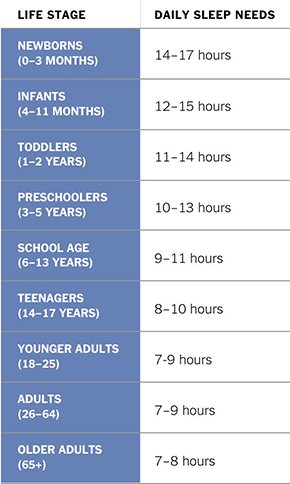A good sleep is EVERYTHING. The quality of your sleep can be a indicator of your overall health and well-being. Sleep resets you and get you ready for the next day. We spend up to 1/3 of our lives asleep, you really want to make sure not only you are getting enough sleep, but enough quality sleep.

HOW MUCH SLEEP DO I NEED?
It depends on your age. Below is a chart that you can follow. Typically for adult between 26 to 64 years old, the number hours of sleep one should get is 7-9 hours per night. If you are not getting 7-9 hours of sleep a night, below are 5 sleep tips that might be useful to you.
5 HEALTHY SLEEP TIPS
Set up a sleep routine. Stick to a sleep schedule of the same bedtime and wake up time, even on the weekends.This helps to regulate your body’s clock and could help you fall asleep and stay asleep for the night.
Sleep on a supportive pillow. Make sure your pillow is comfortable and supportive of the biological curves of your cervical spine. The one you have been using for years may have exceeded its life expectancy, about 2 or 3 years for most good quality pillows. People with pillows that are too soft or hard often complain of neck stiffens, headaches and low pain.
Slow down before bedtime. Your body needs time to shift into sleep mode, so spend the last hour before bed doing a calming activity such as reading. For some people, using an electronic device such as a laptop can make it hard to fall asleep, because the particular type of light emanating from the screens of these devices is activating to the brain. If you have trouble sleeping, avoid electronics before bed or in the middle of the night.
Take a short nap during the day. Taking a nap might seem counter-intuitive to good nighttime sleep, but short naps of 10 to 30 minutes actually help you gain extra energy during the day and don’t disrupt your sleep. Even a 10-minute nap can improve your alertness for 2-and-a-half hours if you’re sleep-deprived, and you can feel the benefit for up to 4 hours if you are well-rested.
Avoid late night heavy meals. Your body isn’t meant to be digesting while you sleep, so a big meal too close to bedtime may keep you up at night. Protein is especially hard to digest, so if you have to eat late, opt for lighter fare.




